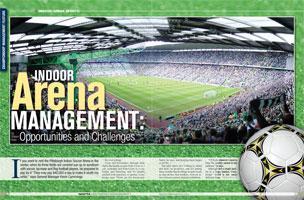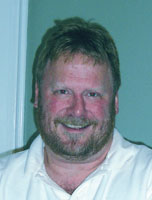
If you want to rent the Pittsburgh Indoor Soccer Arena in the winter, when its three fields are covered sun-up to sundown with soccer, lacrosse and flag football players, be prepared to pay for it.
"They may pay $40,000 a day to make it worth my while," says General Manager Kevin Cummings.
He's not joking.
From mid-November, through mid-April, the facility is open from 3 p.m. to 1 a.m. weekdays and from 6 a.m. to 1 a.m. Friday and Saturday, and it's usually packed with practices or games, Cummings says. Those are his bread-and-butter, he says, and keeping them happy is job No. 1.
But after April, he's willing to wheel and deal, he promises, and it's during those months that he brings in such events as dog shows, flea markets, even an indoor remote-control airplane exhibition. "I'll book whatever I need to keep the facility rented in the summer," he says.
Although he's a small facility in a large market, Cummings' world is not vastly different from large buildings in large markets, or large facilities in small markets.Or for that matter, facilities just plain anywhere.
 The goal is to fill those seats. X those dark days off the calendar. Keep the revenue flowing and the customers happy.
The goal is to fill those seats. X those dark days off the calendar. Keep the revenue flowing and the customers happy.
And it's not always a matter of booking something just to make money, although that's always the hope. Sometimes breaking even is OK if you land an event that will return time and again, hopefully bringing in larger crowds each time.
"If we can make the people who come to the event have an enjoyable stay, then it's a lot easier to ask them to come back," says Jack Hughes, president of the Gainesville Sports Commission in Florida.
There's a wide range of ways to make that happen. In Gainesville, the Sports Commission may give incoming guests a basketful of goodies, including discount tickets to Universal Studios Orlando, about two hours away.
At the Qwest Center in Boise, Idaho, events are expected to tie in with the Grove Hotel, which is physically attached to the center, so discounts may be offered for rooms and meals.
Opening in October, the SpiritBank (CQ) Event Center in Tulsa, Okla., has 25 days dedicated to the Tulsa 66ers basketball team, but already there are 50 other days slated for regional wrestling matches, cheerleading competitions, art shows and home-and-garden exhibitions. Still the new kid on the block, its owners are stepping lightly to make sure they don't run off potential customers.
"We're not trying to nickel-and-dime people," says Sam Remy, vice president of operations and a member of the family that built and owns the center.
In Boise, the Qwest Center starts off with an advantage - 80 days a year are booked with sports. From November through April, the center hosts games by the Idaho Steelheads hockey team from the East Coast Hockey League, the Boise Burn arena football team and the Idaho Stampede basketball team, a minor-league franchise of the Portland Trailblazers and the Seattle Supersonics.
Built in 1997, the center generally hosts events that fit between 5,000 and 6,000 people, depending on whether the floor is used for seating, says John Cunningham, president of Block 22, the company that owns the arena and the Steelheads team. Some are large-scale events that use the arena, including a regular amateur martial arts competition from the Boise-based Championship Cage Fighting, the "Thunder Slam" monster truck and extreme motorcycles exhibition and "Living Proof Live," a conference by religious speaker Beth Moore.
The center also books business conferences, trade shows and other meetings that use both the arena and the meeting rooms, Cunningham says.
Each year, depending on what's out there and what makes sense for the center, anywhere from 25 to 50 other events are booked, he says. "That may seem high" when compared to the announced schedule, Cunningham says, "but some of them are private events and some are open the general public." Private events are not listed on the schedule, he says.
In both cases - as promoter and as building owner - the same criteria applies when picking events, he says.
"Basically we put a pencil to it and do a P&L on each event," he says. "We'll look at how an event has done in other cities to see if we want to take the risk of promoting it ourselves." The same is true for an outside event that simply wants to book the Qwest, hesays.
As promoter, Block 22 examines the financial risk of providing a guarantee to the event owner and whether they can make their money through ticket sales and a cut of merchandise and concessions.
As renters, they take the rental plus a share of merchandise and concessions, as well as fees for providing set-up, tear down and event-day staffing. With an in-house marketing team, Block 22 also will help the event owner with marketing and advice such as the best place to use advertising dollars.
Just as importantly, though, is making sure the Grove Hotel is included in all plans, Cunningham says. The hotel is attached to the center and a major factor with bookings is whether the hotel will be a beneficiary through the rental of hotel rooms or conference rooms and the price of catering and other services, Cunningham says.
It also helps, he says, that he gets along with the other two major venues in the Boise area - the 13,000-seat Taco Bell Center at Boise State University and, in the western suburb of Nampa, the Idaho Center, which has a 13,000-seat indoor arena, an 11,000-seat outdoor amphitheater and a 100,000-square-foot sports center.
If an event owner contacts him and the Qwest doesn't work for the event or has something else already on the schedule, he'll refer the owner to Taco Bell or the Idaho Center,he says, and they do the same for him.
"We all work well together," he says. Rising waters float all boats, he says, and any event that is good for Boise as a whole is good for the Qwest Center.
Down in Florida, the nonprofit Gainesville Sports Commission works as a go-between for the buildings and the event owners, brokering deals that work for everyone, Hughes says. They are chartered by the Gainesville/Alachua County Visitors & Convention Bureau to keep hotel rooms booked and restaurants full, but that entails much more than getting a good room rate. Sometimes the commission finds grants to offset the costs for the event owners; sometimes they'll find a smaller event that matches well with another, larger one in town.
For example, it would be foolish not to tie something in to the football game between the University of Florida, whose campus is in Gainesville, and its arch-Southeastern Conference rival, Louisiana State University, Hughes says. About 100,000 people will be in town for the weekend of that game, he says, and they'll need something to do during the hours before and after the football game. In the past, the commission has booked volleyball and badminton tournaments in the Southwest Recreation Center as possible offerings for antsy football fans.
Organizers of such small events usually are not rolling in money, he says, so the commission can help find the cash to pay officials and other the costs. Since their ultimate goal is to fill hotel rooms and restaurants around Gainesville, it can be a fine line to dance along, he says.
"We want to get a hotel rate that's consistent with the existing rate structure; we don't want to ask them to discount their rates too much," he says. "But we also know the event holder is cost sensitive, so we need to know where that sensitivity is."
Among the 23 venues with which Hughes works are the 16,000-seat Stephen C. O'Connell Center, the 100,000-square-foot Southwest Rec Center, both part of the university, and the 19,000-square-foot Martin Luther King Jr. Multi-Purpose Center, owned by the city of Gainesville.
During his 12 years with the commission, Hughes has worked with, among others event owners, the USA Volleyball League, the USA Synchronized Swimming League, badminton leagues from Baton Rouge, La., and the Florida Firefighter and Law Enforcement Games.
"We put them in touch with the venue, get them face-to-face with the people they need to talk to," he says. "But we have to make good deals with the local facilities because we work with them all the time."
In the next few months, the commission is working with the Renshinkan Karate Tournament, the 2008 Babe Ruth Fast Pitch State Championships and the Eighth Annual Gainesville Senior Games.
In Tulsa, owners of the SpiritBank Event Center still are in the process of attracting events, not only to the 4,500-seat arena but its convention area, exhibition halls and banquet rooms and open-air space. Owners hope to land everything from sports events to business meetings to weddings, Remy says.
"We haven't turned away anybody yet," Remy says.
About 25,000 square feet of retail space and 30,000 square feet for offices also are for rent in the Regal Plaza mall, located alongside the center. The entire project will cost an estimated $60 million.
The event center plans to open in October with a concert, but Remy is playing that one close to the vest.
"I'm not going to say what that is," he said.
At the Pittsburgh Indoor Soccer Arena, one of the main things that GM Kevin Cummings must ensure is that any outside event "won't ruin our million-dollar fields." There are three, one a regulation-size soccer field, 210 feet long by 150 feet wide,and two smaller fields, each 200 feet long by 80 feet wide.
After taking care of the fields' health, it's a question of: "Are they going to bring in high-traffic? Lots of food sales? What kind of clientele are they bringing in, kids or adults?"
The building has held corporate events, chairs and tables arranged on the field. Birthday parties and bar or bat mitzvahs are regular customers. An event can sponsor one of the fields, although two of the three currently have contracts, one with Giant Eagle Express convenience stores and the other with Winchester Thurston School, a local private school.
That one's especially good for the building, Cummings says.
"It's a great marketing tool for us because all of these private school kids coming in and bringing parents and Grandma and Grandpa," he says.
But Murphy's Law is always around, tapping shoulders and saying, "Whatever can go wrong, will." The key to handling those Murphy moments is calmness and preparation, Jack Hughes says.
"Every time (things) don't go as planned," he says with a laugh. "Hopefully, you've thought about what could go wrong ahead of time. When things start to go sour, we find a way to make sure they get corrected."

